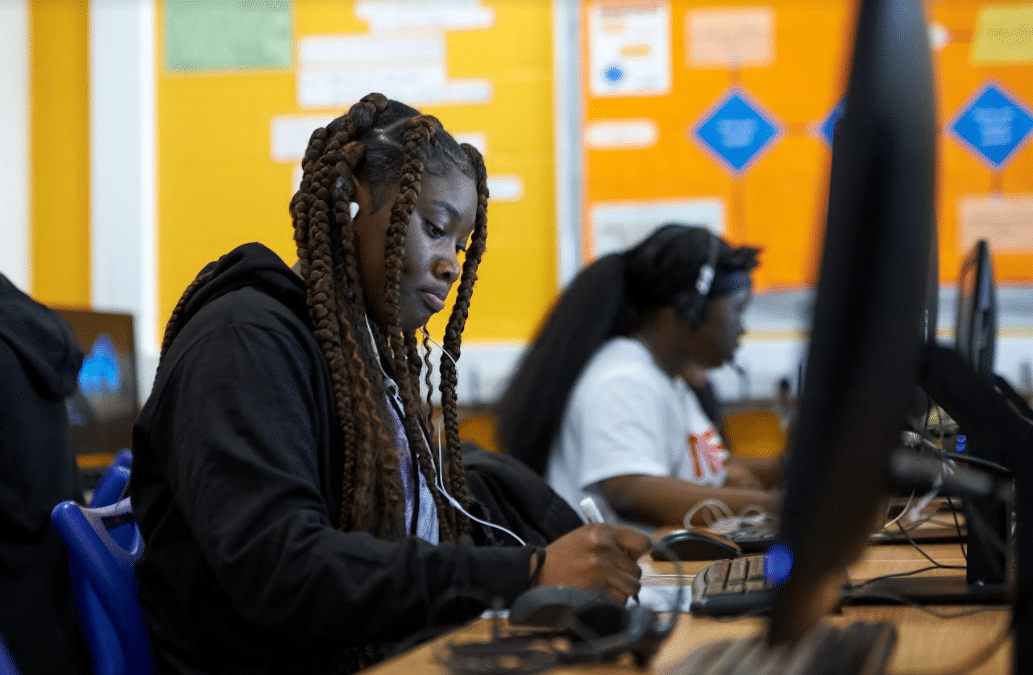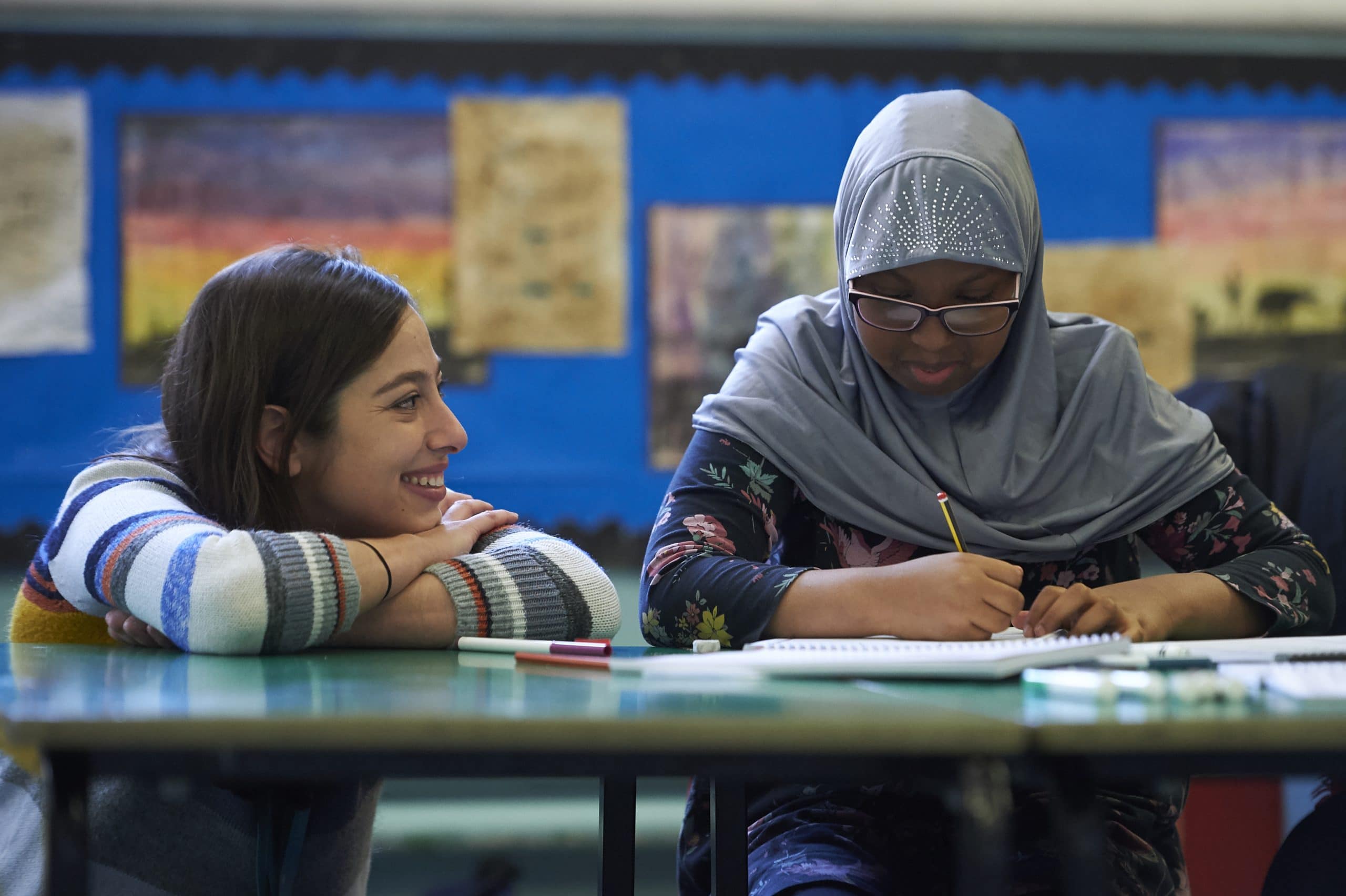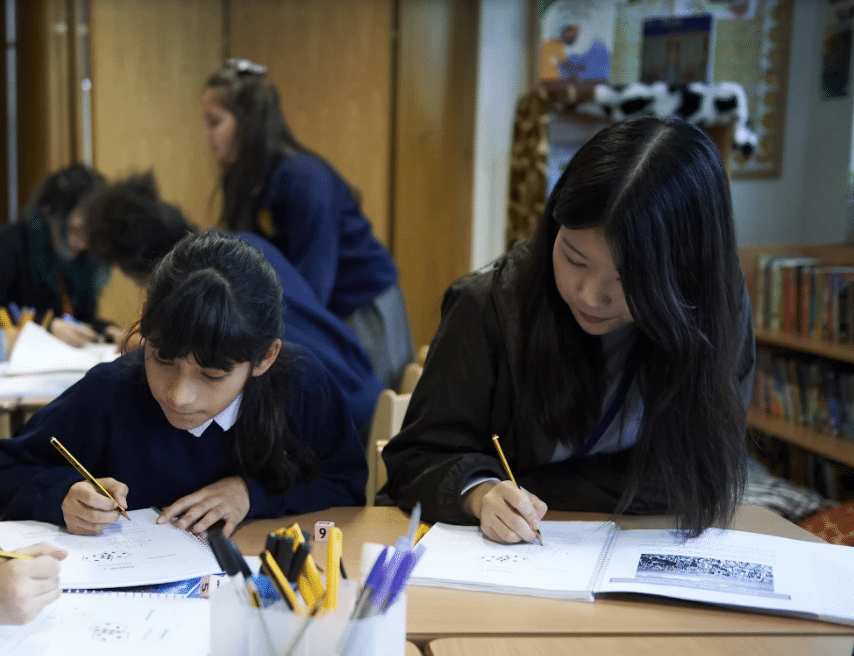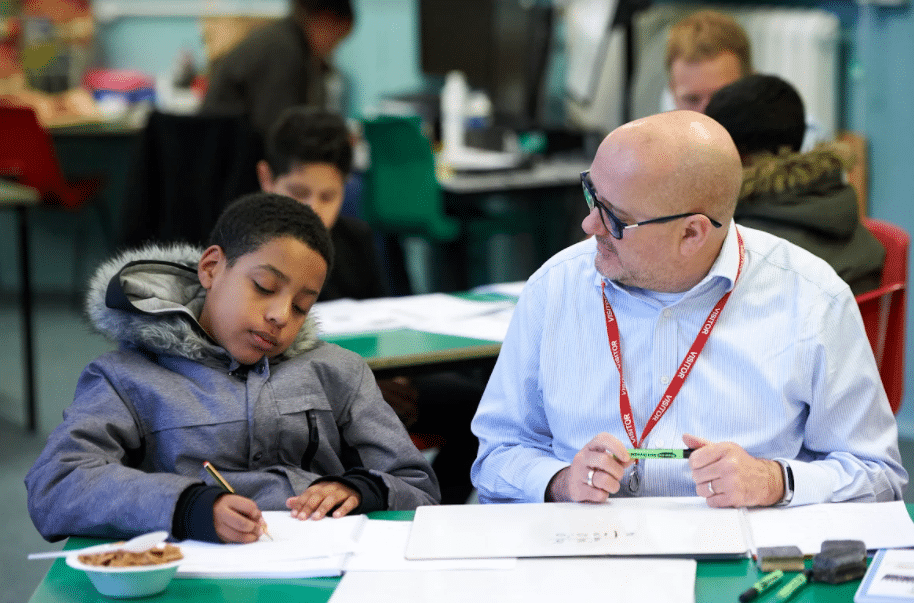
National Tutoring Programme
Action Tutoring is thrilled to be continuing as a National Tutoring Programme (NTP) Tuition Partner for the next three years (2021-24). We are proud to play our part in the catch up drive. The support from the National Tutoring Programme in 2020-21 enabled us to double our delivery, benefiting more pupils than ever before.
Partner as a school Become a Volunteer
What is the National Tutoring Programme?
The National Tutoring Programme is a government initiative, launched in November 2020, to support disadvantaged pupils recover from the educational disruption caused by Covid-19.
Based on the evidence that supports the effectiveness of one to-one and small-group tuition, the Department of Education (DfE) has chosen a group of accepted partners to deliver tutoring to children whose education was most affected by the pandemic.
This year, schools contribute 40% of the cost of tutoring through Tuition Partners as part of the programme, with the remaining 60% of the costs of tutoring covered by the Government’s funding.

Why was the National Tutoring Programme introduced?
Despite continued efforts by teachers and school staff to support pupils’ learning during the school closures, many children have fallen significantly behind in their education. Those who have fallen furthest behind are those from socioeconomically disadvantaged families. This had led to the attainment gap between disadvantaged pupils and their peers increasing to the widest it has been in ten years.
Evidence suggests that tutoring is highly effective in helping pupils catch up. But, only 18% of disadvantaged young people received tuition support during the pandemic (compared to the 43% of pupils from more affluent backgrounds).
Studies show that during the pandemic, 20% of pupils on free school meals had no access to a computer at home, compared to 7% of other children. 40% of children from low-income households did not have a quiet room in which they could study during lockdown.

When was the National Tutoring Programme introduced?
The National Tutoring Programme was announced in June 2020 and launched in November that year.
Action Tutoring was closely involved in campaigning for catch up provision, presenting to the Education Select Committee in 2020. We were one of four charities involved in an online tutoring pilot later in the same year. Our charity has been refining our impactful tutoring model for disadvantaged pupils for a decade. We welcome this national recognition of its benefits and the opportunity for it to become widely available.
Through a collaboration of organisations across the country, our aim is to make this tuition available to tens of thousands of primary and secondary school pupils
Sir Peter Lampl, Chairman of the Education Endowment Foundation, in 2020
The National Tutoring Programme was designed and developed through collaboration with key charities in the education sector – the Education Endowment Foundation, Teach First, Sutton Trust, Impetus, and Nesta. We would like to thank these organisations for leading the NTP in its pilot year, in the face of many challenges.
There were plenty of positive learnings from the first year which will help develop an even stronger programme to reach many more young people in the years to come.

What does this mean for Action Tutoring?
Action Tutoring is a charity which was established long before the NTP and our mission has always been to support pupils from disadvantaged backgrounds. We have not wavered from this focus. In 2021-22, 70% of our pupils were eligible for Pupil Premium funding. This year currently 72% receive the funding, with another 22% whose teachers have confirmed they would not otherwise have access to tutoring. We are committed to closing the attainment gap through our work and ensuring our support reaches the right pupils is crucial to our delivery.
The NTP and additional funding has allowed Action Tutoring to scale its work to reach thousands more pupils across the country. It is our imperative to help as many disadvantaged pupils as possible who’ve been impacted by the pandemic, while ensuring the scale is achievable for a charity of our size and experience.
During school closures in 2021, Action Tutoring gained a huge amount of experience in managing sessions remotely when pupils were based at home. This experience has been invaluable in pivoting to pilot a ‘remote’ model where pupils are in school but Action Tutoring staff and volunteers are supporting remotely. Virtual programmes were launched in 2022, and help us expand our reach to help more disadvantaged pupils even further outside of urban centres.

How does the National Tutoring Programme work?
The National Tutoring Programme is divided into two components; Tuition Partners and Academic Mentors. Tuition partners can include universities, charities and private tuition partners.
Primary and secondary schools can partner with organisations (selected by the Department for Education) to work with tutors or academic mentors. Based on clear guidelines and criteria, schools choose which pupils will receive support outside of the classroom. Tutoring sessions are generally flexible, and can take place either in-person in school or online. Read more about how our programmes work here.
Performance is regularly reviewed through audit processes. These involve analysing the number of pupils and schools supported, absences, quality of sessions delivered, school feedback, safeguarding and tutor training.

Why make use of the NTP?
Initially, the NTP may feel to some state schools like another plate to spin in their never-ending list of urgent priorities. The reality is that NTP supports schools to get additional support for their most vulnerable pupils. Our impact data shows the benefits of volunteer tutoring.
Collaboration and feedback between the teacher, pupils, tutors, and the Tuition Partner will secure the highest chance of success. Not another plate to spin, but another stepping stone to make education an even playing ground for all.
Action Tutoring is a brilliant cost effective way to boost attainment especially for the disadvantaged pupils who are struggling despite the high quality of Quality First Teaching in our school. Targeted pupils receive excellent support with highly qualified tutors who engage and motivate the learners. It has been the best use of our Covid catch-up funding and we are fully committed to continuing this well researched programme to maximise the positive impact.
Kate Dingle, Deputy Head, Queensbridge Primary School

Who is eligible for the National Tutoring Programme?
The National Tutoring Programme has been created to reach the most disadvantaged pupils in state primary and secondary schools in England. All pupils in years 1–11, aged 5–16, are eligible for the national tutoring scheme. Schools are expected to use the funds for disadvantaged children whenever possible, as evidence shows that they were the most impacted by the school closures, and have fallen further behind their non-disadvantaged peers.

How were Tuition Partners selected?
Minimum eligibility criteria
The first step required all applicants to meet the minimum criteria in their proposals. It was necessary to prove that pupils between the ages of 5 and 16 would be supported, and that volunteers would be trained and DBS-checked. The minimum criteria also required applicants to have extensive experience working with schools and to commit to supporting at least 500 pupils throughout the academic year. Lastly, they had to agree to take part in the NTP evaluation conducted by NEFR.
Quality criteria
In this stage, applicants’ proposals must align with the NTP quality criteria and standards. Some of them are summarised below:
Understanding how schools work and the challenges disadvantaged pupils face
Those who apply must have experience in working with schools in order to fully understand their needs and challenges. This will help them better integrate into the school system and deliver effective and personalised tutoring sessions. It is important that they prove the significant impact their work has on disadvantaged pupils and how their mission supports improvement in academic achievement and attainment.
Working closely with schools has allowed us to better understand their needs and provide tailored support. We’ve worked hard to develop an effective tutoring model with proven impact. At Action Tutoring we do more than just tutor – we know how to engage pupils and understand the demands and pressures that busy schools are under.
Excellence in impact
Providers must demonstrate they understand hardships that disadvantaged pupils face, and how tutoring sessions can tackle them. This includes addressing learning barriers, engaging disengaged pupils and acknowledging the possibility of a lack of technical equipment at home for online learning.
We are proud to have an evidence-based approach that clearly demonstrates the positive impact of our work. Pupils sit a baseline assessment at the start of their programme and a progress check in February, roughly halfway through their time with Action Tutoring. This allows us to evaluate their progress, assess our impact in a clear and concise manner and ensure the quality of our tuition.
The average score for tutors rating the quality of our organisation, communication and professionalism of tutoring sessions run by Action Tutoring Programme Coordinators was 4.7 out of 5.
High quality tutoring sessions
Recruit qualified tutors with background checks, who possess the right qualifications and experience in order to provide tutoring services. They all must receive an initial training and learn about safeguarding policies that need to be followed at all times.
High standards are one of our core values and we always strive to achieve excellence in all we do. Our team has produced a portfolio of 12 carefully structured workbooks, designed by curriculum specialists, that include activities created to be effective in a tutoring environment. They motivate pupils to engage during the sessions and think critically.
They motivate pupils to engage during the sessions and think critically, and ensures that Action Tutoring volunteers are supported and receive the proper guidance in order to provide the most effective tutoring sessions.
Evaluation of tutoring sessions and data protection policies
Tutoring Partners should monitor and evaluate tutoring sessions in order to maintain high quality tuition. They should also have clear quality assurance, data protection and privacy notices in place.
At Action Tutoring, we take pride in our evidence-based approach to supporting vulnerable pupils by using regular assessments and progress checks to measure the impact of our tutoring. Our community is made up of qualified and passionate volunteer tutors who have embraced our values and helped us continue helping pupils in need even in the most difficult times.
I have been so impressed with the work of Action Tutoring! Their tutors are so well trained and were able to forge positive working relationships in the first sessions. Their online platform, which we have moved to recently, is incredibly easy to use and the move from face to face tutoring to online has been seamless. If you are lucky enough to partner with Action Tutoring – don’t ever let them go!
– Polly Shields, Deputy Headteacher, Hanover Primary School
If you are interested in learning more, here you can find the full report on the quality criteria of the NTP Tutoring Partners.

How to apply for National Tutoring Programme funding?
Tuition partners funding is available to all state-funded schools and academy trusts in England. If you are a primary or secondary school in England, you will receive funding automatically in your school budget calculated based on the number of Pupil Premium pupils in your school. For more information please see this website and this guidance.

How much do schools pay for NTP?
The subsidy rate for the 2022 to 2023 academic year will be 60%. The remaining costs will be funded Action Tutoring and partner schools.
Action Tutoring focuses on providing targeted and sustainable tuition, delivered by university students, professionals and retired individuals who are all passionate about helping young people catch up on lost learning.
Do you want to learn more about the impact of our work? Read our success stories!
If you want to get involved, complete the application form below and join our community today.



